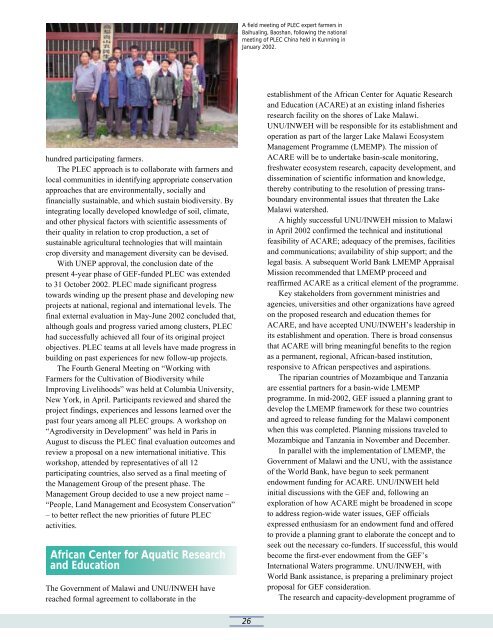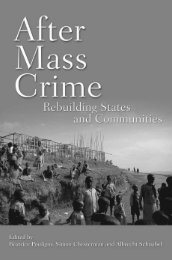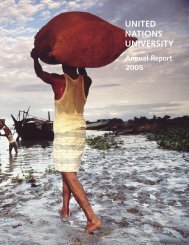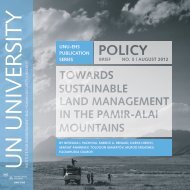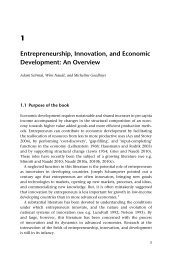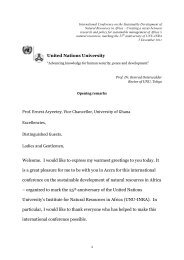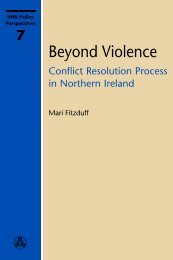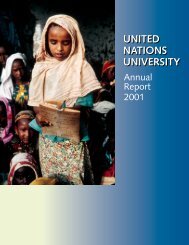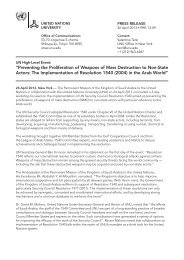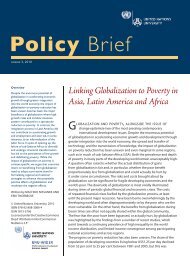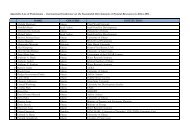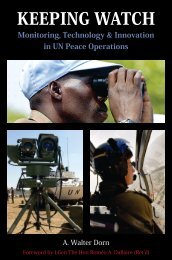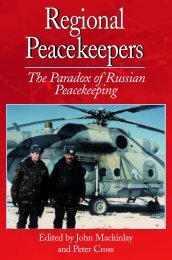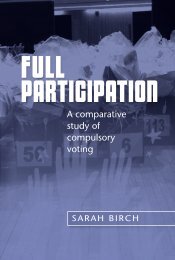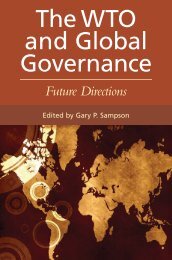Environment and Sustainable Development - United Nations ...
Environment and Sustainable Development - United Nations ...
Environment and Sustainable Development - United Nations ...
You also want an ePaper? Increase the reach of your titles
YUMPU automatically turns print PDFs into web optimized ePapers that Google loves.
A field meeting of PLEC expert farmers in<br />
Baihualing, Baoshan, following the national<br />
meeting of PLEC China held in Kunming in<br />
January 2002.<br />
hundred participating farmers.<br />
The PLEC approach is to collaborate with farmers <strong>and</strong><br />
local communities in identifying appropriate conservation<br />
approaches that are environmentally, socially <strong>and</strong><br />
financially sustainable, <strong>and</strong> which sustain biodiversity. By<br />
integrating locally developed knowledge of soil, climate,<br />
<strong>and</strong> other physical factors with scientific assessments of<br />
their quality in relation to crop production, a set of<br />
sustainable agricultural technologies that will maintain<br />
crop diversity <strong>and</strong> management diversity can be devised.<br />
With UNEP approval, the conclusion date of the<br />
present 4-year phase of GEF-funded PLEC was extended<br />
to 31 October 2002. PLEC made significant progress<br />
towards winding up the present phase <strong>and</strong> developing new<br />
projects at national, regional <strong>and</strong> international levels. The<br />
final external evaluation in May-June 2002 concluded that,<br />
although goals <strong>and</strong> progress varied among clusters, PLEC<br />
had successfully achieved all four of its original project<br />
objectives. PLEC teams at all levels have made progress in<br />
building on past experiences for new follow-up projects.<br />
The Fourth General Meeting on “Working with<br />
Farmers for the Cultivation of Biodiversity while<br />
Improving Livelihoods” was held at Columbia University,<br />
New York, in April. Participants reviewed <strong>and</strong> shared the<br />
project findings, experiences <strong>and</strong> lessons learned over the<br />
past four years among all PLEC groups. A workshop on<br />
“Agrodiversity in <strong>Development</strong>” was held in Paris in<br />
August to discuss the PLEC final evaluation outcomes <strong>and</strong><br />
review a proposal on a new international initiative. This<br />
workshop, attended by representatives of all 12<br />
participating countries, also served as a final meeting of<br />
the Management Group of the present phase. The<br />
Management Group decided to use a new project name –<br />
“People, L<strong>and</strong> Management <strong>and</strong> Ecosystem Conservation”<br />
– to better reflect the new priorities of future PLEC<br />
activities.<br />
African Center for Aquatic Research<br />
<strong>and</strong> Education<br />
The Government of Malawi <strong>and</strong> UNU/INWEH have<br />
reached formal agreement to collaborate in the<br />
establishment of the African Center for Aquatic Research<br />
<strong>and</strong> Education (ACARE) at an existing inl<strong>and</strong> fisheries<br />
research facility on the shores of Lake Malawi.<br />
UNU/INWEH will be responsible for its establishment <strong>and</strong><br />
operation as part of the larger Lake Malawi Ecosystem<br />
Management Programme (LMEMP). The mission of<br />
ACARE will be to undertake basin-scale monitoring,<br />
freshwater ecosystem research, capacity development, <strong>and</strong><br />
dissemination of scientific information <strong>and</strong> knowledge,<br />
thereby contributing to the resolution of pressing transboundary<br />
environmental issues that threaten the Lake<br />
Malawi watershed.<br />
A highly successful UNU/INWEH mission to Malawi<br />
in April 2002 confirmed the technical <strong>and</strong> institutional<br />
feasibility of ACARE; adequacy of the premises, facilities<br />
<strong>and</strong> communications; availability of ship support; <strong>and</strong> the<br />
legal basis. A subsequent World Bank LMEMP Appraisal<br />
Mission recommended that LMEMP proceed <strong>and</strong><br />
reaffirmed ACARE as a critical element of the programme.<br />
Key stakeholders from government ministries <strong>and</strong><br />
agencies, universities <strong>and</strong> other organizations have agreed<br />
on the proposed research <strong>and</strong> education themes for<br />
ACARE, <strong>and</strong> have accepted UNU/INWEH’s leadership in<br />
its establishment <strong>and</strong> operation. There is broad consensus<br />
that ACARE will bring meaningful benefits to the region<br />
as a permanent, regional, African-based institution,<br />
responsive to African perspectives <strong>and</strong> aspirations.<br />
The riparian countries of Mozambique <strong>and</strong> Tanzania<br />
are essential partners for a basin-wide LMEMP<br />
programme. In mid-2002, GEF issued a planning grant to<br />
develop the LMEMP framework for these two countries<br />
<strong>and</strong> agreed to release funding for the Malawi component<br />
when this was completed. Planning missions traveled to<br />
Mozambique <strong>and</strong> Tanzania in November <strong>and</strong> December.<br />
In parallel with the implementation of LMEMP, the<br />
Government of Malawi <strong>and</strong> the UNU, with the assistance<br />
of the World Bank, have begun to seek permanent<br />
endowment funding for ACARE. UNU/INWEH held<br />
initial discussions with the GEF <strong>and</strong>, following an<br />
exploration of how ACARE might be broadened in scope<br />
to address region-wide water issues, GEF officials<br />
expressed enthusiasm for an endowment fund <strong>and</strong> offered<br />
to provide a planning grant to elaborate the concept <strong>and</strong> to<br />
seek out the necessary co-funders. If successful, this would<br />
become the first-ever endowment from the GEF’s<br />
International Waters programme. UNU/INWEH, with<br />
World Bank assistance, is preparing a preliminary project<br />
proposal for GEF consideration.<br />
The research <strong>and</strong> capacity-development programme of<br />
26


